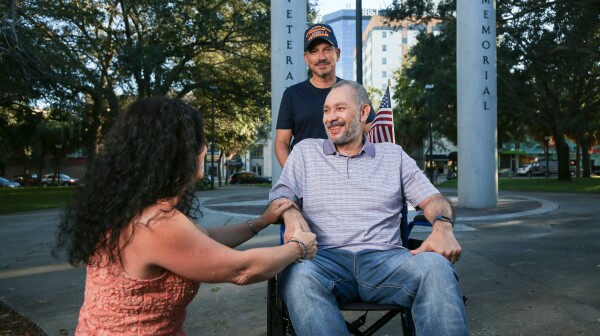AARP Eye Center
CLOSE ×
Search
Popular Searches
- right_container
- Health
- Money
- Work & Jobs
- Advocacy
- Social Security
- Medicare
- Caregiving
- Games
- Travel
- More...
- Entertainment & Style
- Family & Relationships
- Personal Tech
- Home & Living
- Auto
- Staying Sharp
- Podcasts
- Videos
AARP Michigan announced its 2024 Legislative Agenda yesterday during the annual lobby day at Heritage Hall, inside the Michigan Capitol Building. More than 50 dedicated volunteers engaged with legislators, representing both major parties and regions across Michigan.
AARP is championing a plan to increase resources for family caregivers across the state. It would include the expansion of caregiver resource centers and the creation of a statewide website with evidence-based educational and training materials.
For the first time since AARP began publishing the Scorecard in 2011, more than half of Medicaid long-term care dollars nationwide for older adults and people with physical disabilities went to home- and community-based services instead of nursing homes and other institutions.
The conversation continues! As we prepare for a historic election year, AARP Michigan is stepping forward to host an important and much-needed two-part virtual series as part of its MI Sisters & Friends call to action to identify and elevate issues important to women.
Michiganders who provide care for veterans spend on average $11,500 of their personal income on out-of-pocket costs related to caregiving each year—1.5 times higher than what other family caregivers spend ($7,242), according to AARP data. And 43 percent of veteran and military caregivers experienced at least one financial setback such as having to take on more debt or dip into personal savings, according to research from AARP and the National Alliance for Caregiving.
AARP, the nation’s largest nonprofit, nonpartisan organization dedicated to empowering people 50 and older, announced today the priority issues on its 2023 Michigan Legislative Agenda. Approximately 3.9 million residents in Michigan are 50 and over, representing 39% of the state’s population.
Vaccination Booster Rates Remain Stalled Amid Winter Surge
AARP Michigan will push for expanding support for home- and community-based care in the 2023 legislative session.
Are candidates listening to voters 50+? Do they understand their concerns?
AARP Urges Legislators to Focus on Nursing Home Safety
Search AARP Michigan
Connecting you to what matters most, like neighbors do. Find events, volunteer opportunities and more near you.
Sign Up & Stay Connected










































































